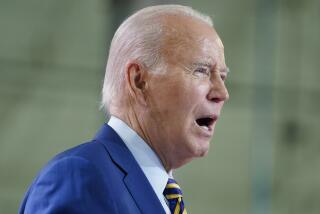Bush Sees Ways to Widen Coverage
- Share via
WASHINGTON — President Bush on Wednesday pointed to soaring health-care costs as the prime culprit for the growing number of Americans without medical insurance as he touted his proposals for expanding access to coverage.
Addressing about 200 small-business owners and their employees, the president said the recent creation of tax-free health savings accounts was a good step toward putting insurance within reach of more people. He also called on Congress to allow the banding together of small businesses to enhance their purchasing power when shopping for group insurance.
“The cost of health care is an issue in our country, and we must deal with it in a rational way,” Bush said.
His remarks underscored the fact that, as in recent presidential elections, health-care reform is emerging as a top-tier issue. In 1992, it helped propel Bill Clinton to the White House; in 1996, Clinton used the issue, particularly the GOP plan to overhaul Medicare, as a potent vote-getter.
Speaking at the Eisenhower Executive Office Building adjacent to the White House, Bush also praised the role of community health centers, which provide primary-care services in rural and under-served urban areas. Bush said they were a cost-effective alternative to expensive emergency-room visits.
During Bush’s term, the number of such centers has increased from about 3,000 to 3,600. The president said he planned to add another 600 by fiscal year 2006.
Bush reiterated his frequent calls for curbs on “frivolous and junk” lawsuits, denouncing them as another engine behind the soaring costs of health care. Such litigation forces doctors to engage in unnecessary “defensive” medicine and leads to higher insurance premiums for consumers and higher malpractice insurance for physicians and hospitals, he said.
“When you drive doctors out of business and drive the cost up because of lawsuits, medicine becomes less affordable and less accessible,” Bush said.
About 43.6 million Americans lack medical insurance. And while overall health-care spending increased by 9.3% in 2002, about 15% of the GDP, medical-insurance premiums increased by 13.9% last year.
The health savings accounts that Bush promoted were created in the Medicare prescription drug bill that the president signed into law late last year.
The measure allows individuals to set aside $2,600 a year, and families $5,150 a year, in pre-tax dollars to purchase high-deductible insurance policies. Premiums for such “catastrophic” insurance policies are considerably lower than traditional health-insurance plans but require their holders to pay as much as $5,000 or more each year in out-of-pocket costs before coverage kicks in.
“These accounts will help working Americans afford health insurance that is growing out of their reach,” Bush said. “Low premiums mean greater affordability and great accessibility, especially for small businesses who are having trouble paying for the health insurance for their employees.”
Such accounts would make consumers aware of the cost of medicine -- and lead to incentives to keep costs down, he said.
But some analysts warned that such accounts would attract mostly the young and healthy -- and the wealthy, who would gain another tax shelter -- while giving more employers incentive to abandon a traditional health insurance benefit.
Gary Claxton, vice president of the Kaiser Family Foundation, a nonprofit, nonpartisan health-care research group, said it was unknown whether health savings accounts alone would increase affordability.
Those with low-incomes probably would not be able to afford to set up such funds, he said. Other experts doubt whether insurers would sell such policies to the elderly or the sick.
Bush also has proposed establishing refundable tax credits of as much as $1,000 for individuals and $3,000 for families to help low-income workers buy insurance.
More to Read
Get the L.A. Times Politics newsletter
Deeply reported insights into legislation, politics and policy from Sacramento, Washington and beyond. In your inbox twice per week.
You may occasionally receive promotional content from the Los Angeles Times.










